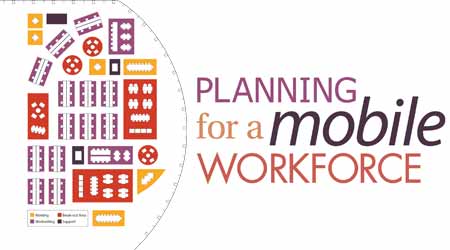Mobile Workforce Raises HR Questions
Third of a three-part cover story article exploring how FMs can adapt their workplaces to an increasingly mobile workforce.
The obstacles to establishing and implementing mobile work policy often fall under the HR umbrella. Deciding who should and should not be identified for mobile work can often open a Pandora’s box of subjective measurements. According to Diane Stegmeier, CEO of Stegmeier Consulting Group, “determining which or how many staff can work effectively from a remote location, participate in on-campus mobility, or enroll in flexible work arrangements must take into account three primary factors: personal competencies, job role, and social needs.” These factors are universal to almost every vertical market and should be considered in the decision making of an employee’s eligibility for mobile work.
From a work process perspective, companies need to formally change their practice of monitoring an employee based upon day-to-day work habits, and begin to evaluate employees on their work product instead. By shifting the focus from observed to achieved performance, as well as establishing expectations and productivity goals, management is better positioned to evaluate an employee’s mobile effectiveness. This change in thinking is often foreign to most managers, and a certain degree of change management must take place in order to help transition them from more traditional ways of employee evaluation.
Related Topics:














